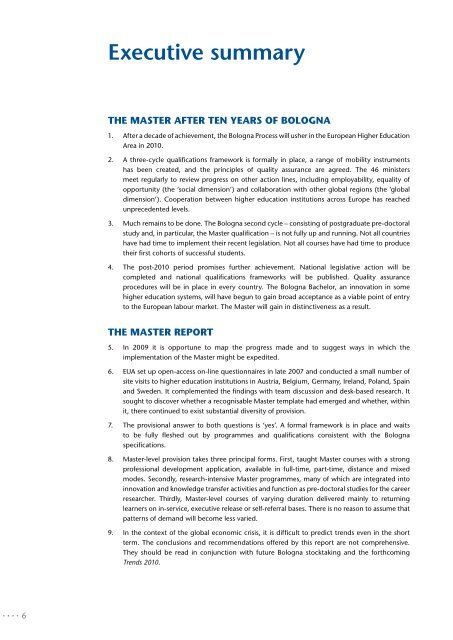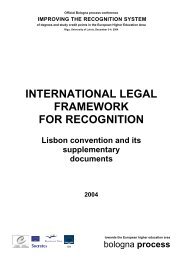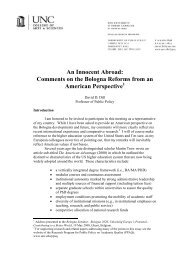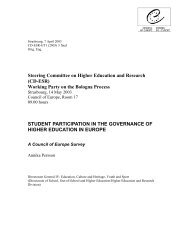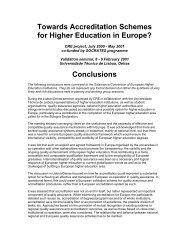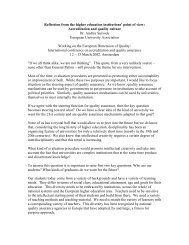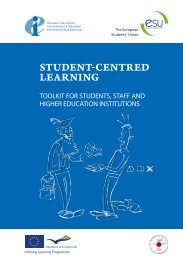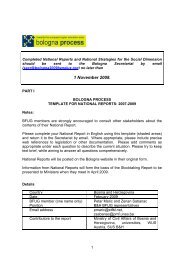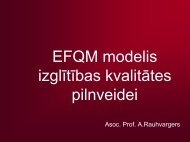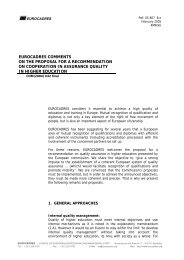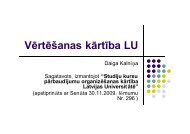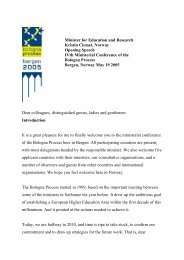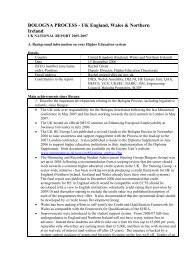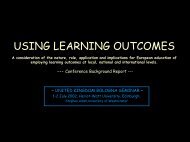EUA Survey Of Master Degrees In Europe - European University ...
EUA Survey Of Master Degrees In Europe - European University ...
EUA Survey Of Master Degrees In Europe - European University ...
You also want an ePaper? Increase the reach of your titles
YUMPU automatically turns print PDFs into web optimized ePapers that Google loves.
Executive summaryThe <strong>Master</strong> after ten years of Bologna1. After a decade of achievement, the Bologna Process will usher in the <strong>Europe</strong>an Higher EducationArea in 2010.2. A three-cycle qualifications framework is formally in place, a range of mobility instrumentshas been created, and the principles of quality assurance are agreed. The 46 ministersmeet regularly to review progress on other action lines, including employability, equality ofopportunity (the ‘social dimension’) and collaboration with other global regions (the ‘globaldimension’). Cooperation between higher education institutions across <strong>Europe</strong> has reachedunprecedented levels.3. Much remains to be done. The Bologna second cycle – consisting of postgraduate pre-doctoralstudy and, in particular, the <strong>Master</strong> qualification – is not fully up and running. Not all countrieshave had time to implement their recent legislation. Not all courses have had time to producetheir first cohorts of successful students.4. The post-2010 period promises further achievement. National legislative action will becompleted and national qualifications frameworks will be published. Quality assuranceprocedures will be in place in every country. The Bologna Bachelor, an innovation in somehigher education systems, will have begun to gain broad acceptance as a viable point of entryto the <strong>Europe</strong>an labour market. The <strong>Master</strong> will gain in distinctiveness as a result.The <strong>Master</strong> report5. <strong>In</strong> 2009 it is opportune to map the progress made and to suggest ways in which theimplementation of the <strong>Master</strong> might be expedited.6. <strong>EUA</strong> set up open-access on-line questionnaires in late 2007 and conducted a small number ofsite visits to higher education institutions in Austria, Belgium, Germany, Ireland, Poland, Spainand Sweden. It complemented the findings with team discussion and desk-based research. Itsought to discover whether a recognisable <strong>Master</strong> template had emerged and whether, withinit, there continued to exist substantial diversity of provision.7. The provisional answer to both questions is ‘yes’. A formal framework is in place and waitsto be fully fleshed out by programmes and qualifications consistent with the Bolognaspecifications.8. <strong>Master</strong>-level provision takes three principal forms. First, taught <strong>Master</strong> courses with a strongprofessional development application, available in full-time, part-time, distance and mixedmodes. Secondly, research-intensive <strong>Master</strong> programmes, many of which are integrated intoinnovation and knowledge transfer activities and function as pre-doctoral studies for the careerresearcher. Thirdly, <strong>Master</strong>-level courses of varying duration delivered mainly to returninglearners on in-service, executive release or self-referral bases. There is no reason to assume thatpatterns of demand will become less varied.9. <strong>In</strong> the context of the global economic crisis, it is difficult to predict trends even in the shortterm. The conclusions and recommendations offered by this report are not comprehensive.They should be read in conjunction with future Bologna stocktaking and the forthcomingTrends 2010.6


